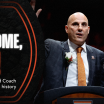The NHL trade deadline is at 3 p.m. ET on March 8. Around the league, teams have their hockey operations departments assembled to discuss and debate potential last day deals. In the Flyers' case, the club has had to weigh the big picture of the organization's long-term rebuild against the immediacy of currently being in playoff position in the Metropolitan Division.
Flyers General Manager Daniel Briere has been steadfast in saying that the long-term goal of creating a perennial contender takes priority over the 2023-24 season, although he hopes the close-knit current team can see through their accomplishments of this season into a spot in the Stanley Cup playoffs.
What Briere doesn't want: a return to the pattern the Flyers fell into during the mid-to-late 2010s: making the playoffs but losing in the first round in six (2016, 2018) or seven (2014) games and then having a down season and failing to qualify the following year.
By trading impending free agent defenseman Sean Walker to the Colorado Avalanche in a deal that netted a conditional 2025 first-round draft pick, Briere demonstrated loud and clear that he was willing to take a temporary backward step on the roster in the aim of taking two steps forward in the future. The Flyers made two first-round selections in 2023, and they now have two first-round picks in 2024 and most likely in 2025. The club also have several upcoming second-round picks at their disposal.
Additionally, Briere has made good on a pledge to weaponize available cap space. The Flyers were willing to take on 50 percent of the remaining contract of veteran center Ryan Johansen -- whom Briere said likely does not fit in the current NHL roster plan -- in order be able to ensure a guaranteed first-round pick for Walker. Briere said on Thursday that he is trying to find another team that will take Johansen at the equivalent of 25 percent of his original $8 million AAV contract (with the Nashville Predators paying half, the Flyers paying 25 percent and Johansen's destination club absorbing the final $2 million) for the current season and 2024-25.
The Fyers sent a 2026 fifth-round pick to Colorado in the Walker trade. Briere subsequently obtained a 2024 fifth-rounder -- which holds the same value as an asset but has the benefit of being immediately usable -- by serving as the middleman in a trade that sent impending unrestricted free agent defenseman Noah Hanifin from the Calgary Flames to the Vegas Golden Knights. The Flyers took on 25 percent of Hanifin's cap hit for the remainder of the 2023-24 season.
A rebuild is not only about being a seller and driving the hardest possible bargain to obtain assets for veterans who can help top contenders stock their rosters for the playoffs. It's also about keeping certain veterans around while the process is ongoing. The Flyers made a decision that Nick Seeler (re-signed to a four-year contract extension at a $2.7 million AAV) holds more value internally as part of the roster than he would in terms of the asset that would come back in a trade.
One final component to approaching a trade deadline from the Flyers perspective: Whether a deal goes down by the deadline, discussions resume in the offseason or nothing ends up coming to fruition, it's important for a general manager to stick to his guns. This is particularly important with a still relatively inexperienced GM. Briere is establishing that his valuations of players and assets (either incoming or outgoing) will stay firm. There is wiggle room for creativity in seeing the deal to fruition so that it works for both sides, but not to the point of making a deal at any cost.
Uncertain Time for Players
The final few days before the trade deadline are always tense for players on expiring contracts or otherwise rumored to be part of potential trades. Each year at the deadline, I think back to something long-time Flyers winger Michael Raffl said on the day of the 2019 deadline: the same day that Wayne Simmonds was traded to Nashville at roughly 2:55 p.m. ET.
"It's like school," Raffl said. "You wait for class to be over. It takes forever. You know that this is not in my control. It's not, like, nervous. It's a different feeling. It's torturous."
If deadline day coincides with a team practice -- which is not the case for the Flyers this year -- some players will gather around a television set or repeatedly check their phone for text messages. Others will try to find distractions.
Back on deadline day five years ago, Raffl nicely summed up how he and other players would try to deal with the final few days before the deadline.
"At home, maybe, you go out and take a walk. Maybe listen to music. Whatever you can do. You don't have the structure at home you have at the rink. So you kind of get in your own head. Here [at the rink], the boys make jokes and we try to help each other pass the time. But [the deadline] is in everybody's mind. You can't help it," he said.
Back in 2019, Raffl's time with the Flyers was not up yet. He'd remain with the team for two additional years before being dealt to the Washington Capitals for the remainder of the 2020-21 season and playoffs. In total, Raffl spent all or most of eight seasons with Philadelphia. He always reacted th same way when the trade deadline passed: with a big sigh of relief.
"I slept like a baby that night," Raffl said on March 3, 2019.
The years change and names change. But the experience itself does not. The tension is universal and timeless on deadline day.



















